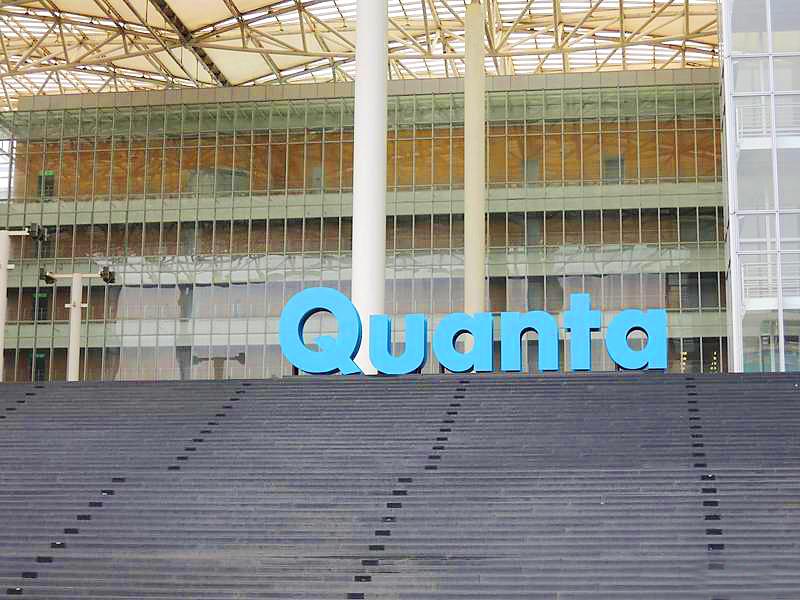Quanta Computer Inc (廣達電腦), an assembler of Apple Inc’s MacBooks, has partially resumed operations in Shanghai after a surge in COVID-19 cases led to lockdowns in the city.
The Quanta Shanghai Manufacturing City (QSMC, 廣達上海製造城), Quanta’s manufacturing base in Shanghai, on Friday resumed production with about 2,000 staff members working in a closed-loop management system, Xinhua news agency reported on Sunday.
Production at its F1 and F3 factories, which make laptops for Apple and accessories for Tesla Inc respectively, was under way, the report said.

Photo: Vanessa Cho, Taipei Times
The resumption means that 5 percent of QSMC’s 40,000 employees across eight factories in Shanghai have returned to work.
Quanta, the world’s biggest contract laptop manufacturer, on Wednesday announced that its subsidiary, Tech-Com (Shanghai) Computer Ltd (達功上海電腦), had halted production in response to the Shanghai city government’s introduction of COVID-19 prevention measures.
As Shanghai struggles to contain its worst COVID-19 outbreak in two years, disease prevention restrictions continue to put pressure on China’s economy.
To tackle the issue, the Chinese Ministry of Industry and Information Technology on Friday unveiled a white list of 666 companies in sectors including automobiles, semiconductors, consumer electronics, food, equipment manufacturing, medicine and foreign trade for which priority would be given to resume production in Shanghai.
Companies applying to resume work must stock up on medical supplies and establish closed loops for workers, who must live at their workplace or be limited to traveling between work and home, guidance issued on Saturday said.
Contract chipmaker Taiwan Semiconductor Manufacturing Co (台積電), whose production in Shanghai’s Songjiang District is on the list, on Sunday said that its operations in the city had not been halted.
Also on the list are Taiwan-based IC packaging and testing services provider ASE Technology Holding Co’s (日月光投控) Shanghai factory, as well as Unimos Microelectronics (Shanghai) Co (紫光宏茂微電子上海), a company formed after China’s Tsinghua Unigroup Co (清華紫光) acquired a major share of Taiwan-based ChipMOS Technologies Inc’s (南茂科技) Shanghai subsidiary.
At least 30 Taiwanese firms, most of which make electronic components, on Wednesday said that the Chinese government’s COVID-19 control measures in eastern China had led them to suspend production, Reuters reported.
Despite the white list of priority companies, logistical bottlenecks persist due to closures ordered by authorities in other cities, as well as port and trucking disruptions.
An unnamed executive at a listed pharmaceutical firm told Shanghai Securities News that it was unclear how to transport goods, return orders or collect bills when resuming work given the ongoing curbs.
“These are real problems that the policy still needs to address,” the newspaper quoted them as saying.
Meanwhile, Tesla has restarted production at its Shanghai factory and laid out stringent measures for staff operating in the closed-loop system after a weeks-long suspension, people familiar with the matter said.
The electric vehicle maker’s Shanghai plant was producing about 2,100 vehicles a day, churning out 182,174 in the first quarter.
Ramping production back up from such a long shutdown would not be an instant process.
Tesla only has inventory for just more than two weeks based on its new closed-loop schedule, and logistics are a major problem for many other parts, another person familiar with the matter said.
Additional reporting by Reuters and Bloomberg

NEW IDENTITY: Known for its software, India has expanded into hardware, with its semiconductor industry growing from US$38bn in 2023 to US$45bn to US$50bn India on Saturday inaugurated its first semiconductor assembly and test facility, a milestone in the government’s push to reduce dependence on foreign chipmakers and stake a claim in a sector dominated by China. Indian Prime Minister Narendra Modi opened US firm Micron Technology Inc’s semiconductor assembly, test and packaging unit in his home state of Gujarat, hailing the “dawn of a new era” for India’s technology ambitions. “When young Indians look back in the future, they will see this decade as the turning point in our tech future,” Modi told the event, which was broadcast on his YouTube channel. The plant would convert

‘SEISMIC SHIFT’: The researcher forecast there would be about 1.1 billion mobile shipments this year, down from 1.26 billion the prior year and erasing years of gains The global smartphone market is expected to contract 12.9 percent this year due to the unprecedented memorychip shortage, marking “a crisis like no other,” researcher International Data Corp (IDC) said. The new forecast, a dramatic revision down from earlier estimates, gives the latest accounting of the ongoing memory crunch that is affecting every corner of the electronics industry. The demand for advanced memory to power artificial intelligence (AI) tasks has drained global supply until well into next year and jeopardizes the business model of many smartphone makers. IDC forecast about 1.1 billion mobile shipments this year, down from 1.26 billion the prior

People stand in a Pokemon store in Tokyo on Thursday. One of the world highest-grossing franchises is celebrated its 30th anniversary yesterday.

Zimbabwe’s ban on raw lithium exports is forcing Chinese miners to rethink their strategy, speeding up plans to process the metal locally instead of shipping it to China’s vast rechargeable battery industry. The country is Africa’s largest lithium producer and has one of the world’s largest reserves, according to the US Geological Survey (USGS). Zimbabwe already banned the export of lithium ore in 2022 and last year announced it would halt exports of lithium concentrates from January next year. However, on Wednesday it imposed the ban with immediate effect, leaving unclear what the lithium mining sector would do in the